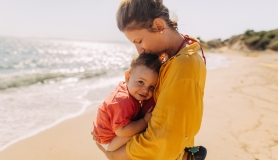History of Preschools in Britain
Provision for preschool education, for all children, is a relatively recent introduction to the British education system. The first nursery school in the world was founded in Scotland in the early 19th century by Robert Owen for the young children (aged between 1 and 6) of cotton mill workers. Owen believed in free, unstructured play and physical activity rather than formal learning and his example led to significant interest in nursery schools and early years education. With the passage of the Education Act in the late 19th century, compulsory primary education for children aged between 5 and 13 was introduced but children under 5 were often admitted due to the poor living conditions of many families at the time. However, inspectors from the Board of Education found that learning provisions for children under 5 were unsuitable due to the “rote memorization” form of learning that was popular at the time. As a result, under 5’s were excluded from primary education and the inspectors’ report, released some 35 years after the initial Education Act, stressed the importance of a separate learning facility with a different teaching approach. A short time later, sisters Margaret and Rachel McMillan established the first open-air nursery in London. Inspired by Margaret’s socialist philosophies, the nursery emphasised free, unstructured play, fresh air, nourishment and exercise. Many of these methods still influence current early-years curriculum.
By the 1960s, as the importance of play in education became more widely accepted, many Local Education Authorities had opened play based preschools across the county but the Ministry of Education’s Circular 8/60 meant that growth of preschool education was not likely to be expanded due to the limited number of teachers available for primary schools. In 1961 Belle Tutaev, a young mother living in London, wrote to The Guardian about how the lack of state preschool provision for her daughter had led to her creating a preschool group of her own. The response to the article was so overwhelming, with many wishing to set up similar groups and some having started groups of their own already, that Belle set about connecting people and within a year the Pre-School Playgroups Association was born and within five years the member base had grown to over 2000. The Pre-school Playgroups Association is still an active charity today, now known as the Pre-school Learning Alliance.
With demand for preschool provision increasing, the then Secretary of State for Education, Margaret Thatcher, proposed via a white paper on education entitled “Education: A framework for Expansion” that preschool education should be available for all who needed it. However, due to the economic recession throughout the 70s and 80s, little progress was made. It was only in 1996, under the conservative government of the time, that vouchers were introduced for part time preschool education for 4-year-olds to attend preschool. However, in order to register to receive the vouchers preschools had to demonstrate that they were working toward “Desirable Outcomes” as define by the School Curriculum and Assessment Authority. Desirable Outcomes are specific learning goals that children are expected to achieve by the time they enter primary education.
The voucher scheme was abolished the following year by the new labour government who set about giving direct funding to preschools who qualified by following “Desirable Outcomes” which later became known as “Early Learning Goals”. As of 2004, the availability of free, part-time, preschool education in Britain for 3 and 4 year olds was put into law. Today more than 98% of 4-year-olds, and 94% of 3-year-olds, attend preschool to some degree.
Who benefits?
Under the recent conservative government and a growing economic crisis, the pressure for parents to return to work is mounting. Children aged as young as 2 are now being offered free preschool provision. On paper, the philosophy is similar to that of Robert Owen; often, both parents find themselves working long before their children are 2 years old anyway and disadvantaged children benefit from quality early years education. But with rising national debt motivating much of current policy, such as mothers now being forced to return to work once their youngest child is primary school aged (no previous requirement for families supported by another parent), preschool provision for younger and younger children is rapidly becoming a government enforced necessity for many families rather than regulated, free childcare for working families. Despite assertions from the government that places will mainly be for disadvantaged children, the move comes at a tense time for the economy which sees increasing numbers of children queuing outside the doors of food banks due to astronomical cuts in benefits for the most disadvantaged.
The benefits of preschool are often cited as being the main motivator for parents, after necessity. Research in favour of preschool can be difficult to pick through, with the purported benefits often being applied to all children. Naturally, parents are keen for their children not to miss out on the social and educational benefits of preschool. And, with attendance rates being as high as 94% across the UK, we are living in a time where it is very much “the done thing”. With many parents operating under the belief that preschool is not only beneficial, but necessary, we are perhaps overlooking some important issues. Given that each child is a unique personality, the evidence suggesting that preschool is a different experience for a child from a loving, progressive home than for children from more deprived homes is mounting.
The harsh reality
Contrary to popular belief, preschool may actual be harmful to the emotional and social development of children. According to a large scale investigation into the effects of childcare upon children under the age of 5, The National Institute of Child Health and Human Development found that the more time a child spends in childcare the greater their risk of behavioural problems. In fact, increased time in preschool was also associated with an increase in mothers reporting lack of social competence in their children. These findings were replicated by Loeb et al 2007 who found an increased risk of behavioural problems in children who were in centre based care for just 3 hours per day, with effects increasing dramatically in children who are there for longer hours and even more so in children who begin younger than 3.
Alarmingly, research from both Stanford University and University of California discovered that this effect was most prominent in children from middle-class, loving homes. The reasons for this are varied. Whilst quality of childcare remains an important factor, and parents should always spend time researching the best preschools for their children, the reality of the situation is fairly simple to understand. Children of preschool age do not learn important social skills from other pre-schoolers, in fact they are likely to learn a variety of “negative” behaviours and very little about dealing with their emotions and how to best express them. These behaviours are then repeatedly reinforced.
The warehousing of small children, we have discovered, is a relatively recent concept. Our paleolithic ancestors lived, instead, in small communities with varied age groups and children learned social cues from older members of the community. They were also cared for by family and friends to whom they had naturally formed secure attachments. This would be more easily replicated in a regular child-minding situation or, for parents who favour preschool, Montessori education than a standard preschool set-up. Both of which are associated with more favourable outcomes.
Educationally speaking, whilst many studies have indeed demonstrated that preschool education has positive effects upon mathematics and literacy, none so far have shown any particular advantage over attentive parenting in the preschool years. In fact, a Stanford University report found the positive effects were only demonstrable in children from disadvantaged backgrounds. In other words, there are no educational benefits to preschool for children with loving, attentive parents regardless of their own educational status.
The wrong direction
Looking to the Pre-school Learning Alliance, whose work and efforts have driven much of the preschool education movement, it became very clear in the very early years of their formation that “children learn better when their parents are involved”. Unfortunately, this translated more into parents replicating techniques at home due to work commitments rather than regular, active involvement in preschool groups. Perhaps an important issue has been overlooked, with Home Education often disregarded by most as something they would not feel confident engaging in. The unfortunate reality, however, is that a lack of significant improvement in our economic situations, and therefore our work/life balance, along with our modern community set-ups has meant preschools are indeed necessary for many families. Thanks to recent changes to working tax credits agreements, mothers from single and low income families are now finding themselves having to work in order to qualify for state support making Home Education an impossible choice regardless of the individual needs of each child.
In these situations, with Montessori education often out of their price range and good child-minders hard to come by, many parents are faced with no viable alternative to preschool. And with the risks mounting due to increased pressure to return to work earlier and earlier, alongside plans to usher children as young as 2 into school – it begs the question, who is preschool really benefitting?



_278_160_c1.jpeg)



